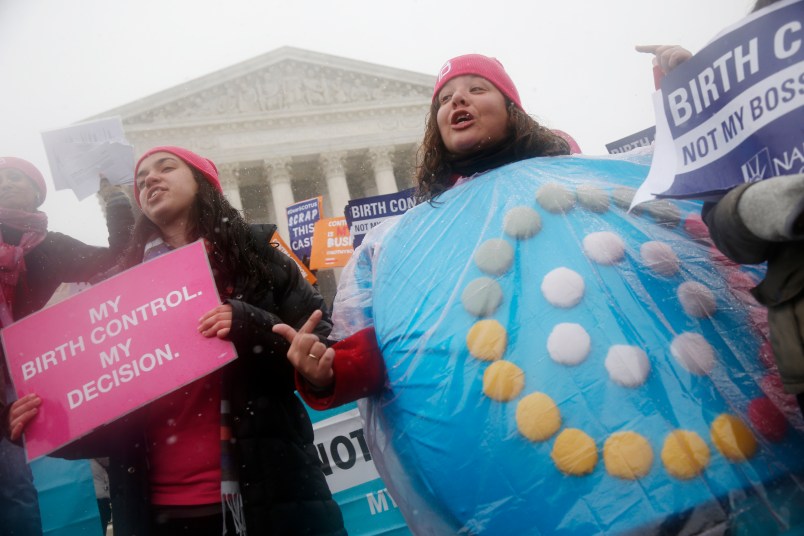Wheaton College has taken its battle over Obamacare’s birth control mandate from the courtroom to its campus.
The evangelical college in Illinois told its students last week that it would be ending the health insurance plans it had been offering them due to its case against Obama administration, the Chicago Tribune reported.
The school terminated its plan not due to the fact that it was being forced to pay for contraceptive coverage — it is not — but that it is in a legal battle over whether it should even have to notify the government that it is seeking a religious exemption to providing contraceptive coverage. The current policy for religious non-profits gives them an exemption, at which point the government directs insurers to provide birth control coverage through a separate policy not paid for by the non-profit.
Wheaton contends that even the act of notifying the government of its religious opposition to birth control coverage makes it complicit in providing birth control. A federal appeals court has rejected Wheaton’s contention, so rather than comply with the requirement that it notify the feds, Wheaton is ending all health coverage for students.
“We are attempting to protect the larger lawsuit the college has against the Department of Health and Human Services,” Paul Chelsen, Wheaton’s vice president of students affairs, said in a live-streamed information session, a recording of which was obtained by the Tribune. “The reason protecting that case is so important is because basically what has happened is the government is telling us we have to offer something that we find morally objectionable.”
Wheaton is just one of a number of religious schools and businesses suing the government over a requirement in the Affordable Care Act that insurance plans cover birth control, including the types of emergency contraceptives some believe amount to causing abortions. The craft store Hobby Lobby prevailed in its Supreme Court case seeking an exemption to the mandate last year, and days later the justices issued an emergency injunction in the Wheaton case.
Earlier this month, the Department of Heath and Human Services codified its policy that allows an organization wishing to opt out of contraceptive coverage to notify the agency of its religious objections, at which point, prompting the HHS to notify insurers to offer the coverage separate from the organization’s plan. However, Wheaton and other institutions say even filling out the exemption form stating their religious objections is a burden on their beliefs, as the process still triggers contraceptive coverage.
A few weeks ago, the Seventh U.S. Court Circuit of Appeals rejected Wheaton’s logic, and appeals courts across the country have ruled against organizations making similar arguments.
“Wheaton College does not want to be involved in the provision of emergency contraceptives; pursuant to its wishes, it no longer is involved,” Justice Richard Posner said in the decision that refused Wheaton a preliminary injunction.
Other religious non-profits making Wheaton’s argument have appealed their case to the Supreme Court.







So did Wheaton College also renounce its standing in the lawsuit by this act? Since it accepts federal funds via student aid, et.al,. what other federal law does it violate?
Because denying life-saving medical coverage for thousands of students and faculty is Pro-Life™
The oddity of this decision by Wheaton is that now its students, who are suddenly uninsured, will mostly get coverage elsewhere (perhaps on their parents’ insurance if they are under 26 and their parents have insurance, perhaps heavily subsidized through the exchanges). Any of those methods will result in the students getting coverage for birth control. So Wheaton’s actions have set in motion a chain of events that will lead to birth control being covered for their students – exactly the outcome they were trying to avoid.
Except now, the students or their parents will have to pay more for their coverage. Heckuva job, Wheaton!
It’s okay as the students of Wheaton College, one would presume, are all committed Christians who aren’t having pre-marital sex anyway, so what’s the rub? Any of the co-eds protesting this can be assumed to be sinners who ought to be made to wear clothing with a big “A” or “F” sewn on them. Otherwise, given the social constraints and chill and, likely, dearth of intellectuality there, why would any non-Evangelicals bother to enroll at such a “school”?
I’m sure the dorms at this “Christian” college serve only kosher meals, as the Bible requires, right?